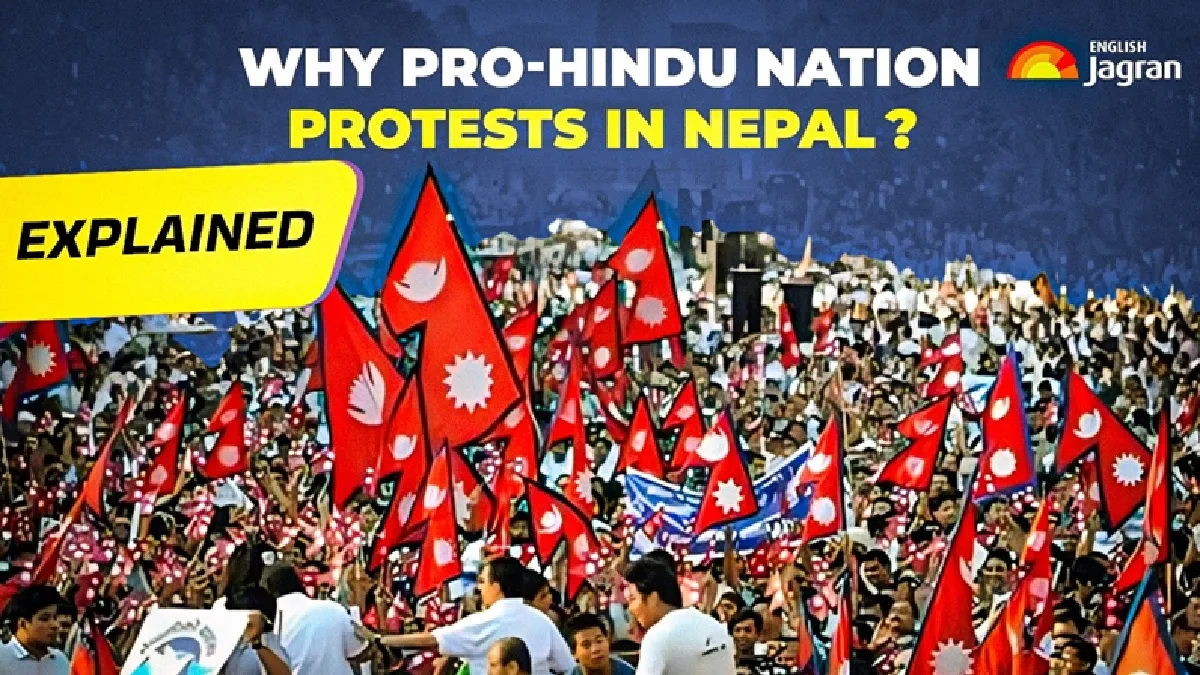- By Raju Kumar
- Sat, 29 Mar 2025 03:05 PM (IST)
- Source:JND
Nepal Protests: Nepal - which was the only Hindu nation before democracy's commencement in the Himalayan nation in 2008 - has been facing unprecedented protests for the last couple of days in favour of the return of the monarchy, a Hindu kingdom.
The Nepal police arrested a total of 51 people, including the senior vice-chairman of the Rastriya Prajatantra Party Rabindra Mishra, General Secretary Dhawal Sumsher Rana, pro-monarchy activists like Swagat Nepal, Shepherd Limbu and Santosh Tamang as well as some other leaders for instigating violence during Friday's pro-monarchy demonstrations.
Top pro-royalist movement leader Nawaraj Subedi under arrest
The chief coordinator of a pro-royalist movement, Nawaraj Subedi has been put under house arrest, and security agencies in Nepal are searching of the 'chief commander' of the royalist movement, Durga Prasai.
Voice growing for return of Hindu Kingdom
The protests for a 'Hindu state' saw a sudden surge in Kathmandu after a massive demonstration on March 9 to welcome Nepal's former King Gyanendra as he returned from Pokhara.
Who is Nawaraj Subedi?
Subedi is a pro-royalist movement leader. He formed an alliance led by Rastriya Prajatantra Party to protest in favour of monarchy. In the 1980s, Subedi served as the chairman of the Rashtriya Panchayat, legislative body during the partyless Panchayat system.
Why is a protest against democracy swelling in Nepal?
The government elected by democratic process miserly failed to meet people's expectations. When democracy replaced monarchy in 2008, Nepalese were hopeful for revolutionary changes as promised by the pro-democracy parties, especially Left outfits. The decade-long armed struggle marked the end of the monarchy in the Himalayan, paving the path for democracy. However, the 17-year-long journey of Nepal as a democratic country has not been so encouraging. During this period, Nepal did not see a stable government as the ruling party or alliance kept changing. Nepal saw 13 Prime Ministers in the last 17 years in the democratic setup which narrates that democracy is not so successful in the Himalayan nation.
Here, we listed other reasons that strengthened the demand of return for royalist government:
Lack of strong leadership: Democracy in Nepal has faced significant challenges, leading to its failure in many aspects. One major issue is the lack of effective leadership, with ruling elites and political leaders prioritising personal interests over national welfare.
Rampant corruption: Corruption is another major reason for why people want the kingdom to return. According to a Transparency International report in 2020, Nepal saw a 58 per cent increase in corruption cases in a single year.
Political violence: The politicisation of crime is a big issue in Nepal, with politicians protecting criminals and engaging in corrupt practices. The absence of good governance, deteriorating law and order, and the criminalization of politics have further eroded trust in democratic institutions.
Lack of inclusivity: The failure of democracy in Nepal can also attributed to the lack of inclusivity and representation. Nepal often faces agitation as several communities accuse the government of overlooking them. Despite having a diverse population, comprising various ethnicities, cultures, and religions, Nepal has not been adequately represented in the democratic government. This has led to feelings of marginalisation and exclusion among certain groups.
Furthermore, the influence of globalisation and foreign powers has also impacted Nepal's democratic system. The country's leadership has been criticised for being more accountable to foreign powers than to its own citizens. The democratic government has not been able to capitalise the historical friendly relation with India. A section of people in Nepal allege that the government ignore Indian businessmen's investment proposals.
Pro-republic system vs pro-monarchists in Nepal
To counter the growing demand for the return of the kingdom in Nepal, a Socialist Forum, a four-party alliance, was forged. They were also planning to hold protests in favour of the republic system, which means in the coming days the Himalayan nation may witness more agitations. The Communist Party of Nepal-Maoist Centre, and CPN-Unified Marxist Leninist, among others, declared their support to pro-public protests.

